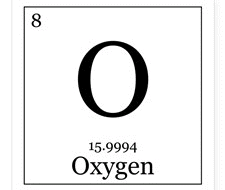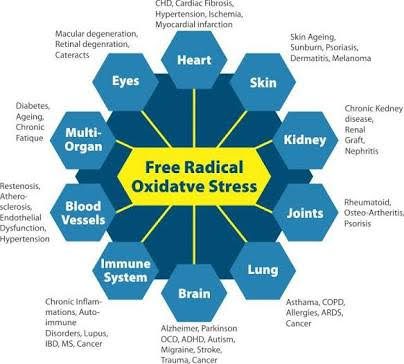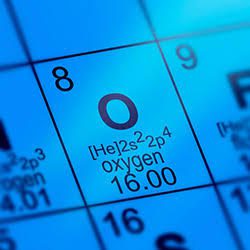Proteins, carbohydrates, fats, water, vitamins and minerals. These are the general categories of biomolecules that your body is made up of. One thing that’s common to almost all, if not literally all of these, is a certain element. If you thought of Carbon, think again. There’s another – Oxygen.

Each of the biomolecules I mentioned has varying degrees of oxygen in it, whether attached directly or indirectly to the molecule or ion, without which it would not exist. In this context, it is rather obvious that oxygen is super essential to life itself. Did I forget to mention it’s what we need to respire, every second of your life?
At the same time though, it is oxygen itself that may be responsible for our eventual death. There’s been growing evidence which suggests that the life-supporting element may actually contribute to ageing, and therefore, to our seemingly short lifespan.
How Oxygen Exists Within Us
Before delving into how oxygen may be a cause of death, it is important to grasp how it exists in living beings. Oxygen in a living body is found dissolved within water, combined in a larger molecule (eg. Glucose C6H12O6), as oxide ions (O2-), or as Reactive Oxygen Species (ROS) namely, superoxide radicals (O2–), hydroxyl radicals (OH) and hydrogen peroxide (H2O2).
While water is basically consumed, and glucose is produced via the Krebs’ cycle, the production of ROS takes place through 3 different processes:
- Oxygen Inhalation
As much as Oxygen is essential to life, it is also believed that for every 100 Oxygen molecules you inhale, there are 1-2 ROS ions you also breathe in. However, this is not the primary source.
- Respiration and metabolism
The major as well as most important process through which Reactive Oxygen Species (ROS) are produced is respiration. Some internally generated sources of free radicals are Mitochondria & Peroxisomes (cellular components), Inflammation, Phagocytosis (when your cells engulf certain molecules, other cells, pathogens, etc.), Exercise, and Ischemia/reperfusion injury, enzymatic and non-enzymatic reactions. Higher the metabolism, greater the production of ROS.
- Miscellaneous
Radiation – both natural and man-made, cigarette smoking, industrial chemicals and fumes, drugs, pesticides, air pollution, X-Rays, etc. are responsible for a minor proportion of the Reactive Oxygen Species in our bodies.
The Onset of Ageing
Free radicals are highly reactive chemical species that lack one electron. They are so unstable, they go around looking for any available electrons, regardless of what the electron-donating molecule can be. Since Reactive Oxygen Species produced in the body is, in fact, free radicals, they do pretty much just that. They attack any molecule until they acquire an electron for increased stability. The most popularly attacked molecules are lipids, DNA, and proteins, as well as carbohydrates and combinations of these, such as lipoproteins (lipid+protein), glycoproteins (carbohydrate+protein), and plenty of important metabolic processes, etc.
This isn’t a positive process at all. In fact, there’s cellular damage involved. Lipoproteins form cell membranes, proteins form hormones, enzymes, muscles, etc., and intact DNA commands all the normal functioning of your body. Attacking cell membranes often means that they are broken and thus, the cells die. After several million consequent cells deaths of this kind, without significantly quick cell replacement or repair, we say that the body has begun ageing.
This is ‘Free Radical Theory of Ageing’.
Anti-Oxidants
Now, there do exist several molecules that can combat this process. Ever wondered what anti-oxidants do? According to research, fruits like berries, citrus fruits, nuts, vegetables, fish oils, etc. basically contain Vitamins A, C and E which are anti-oxidants supplemented through food. The human body itself also produces enzymes that demonstrate anti-oxidant functions. These vitamins and enzymes supply the produced Reactive Oxygen Species with an electron, or take up the extra electron from it, thus stabilising these species. And so, anti-oxidants are the saviours of your body’s cells. In other words anti-oxidants prevent ‘oxidative damage’.
However, when there’s an imbalance between the level of oxidative damage and the body’s ability to combat it, a harmful condition called Oxidative Stress occurs. This may a possible cause for several diseases like cardiovascular disorders, cancers, mutations, Parkinson’s disorder, and so many others are caused.

All these diseases, as well as just ageing bring us much closer to death everyday than what we probably would have without the presence of Reactive Oxygen Species.
Related: The War Against Ageing
Scientists are currently working on reversing ageing. Corporations are in on it too. Alphabet’s subsidiary Calico is in fact, entirely focusing on ‘defeating death’ and helping us gain some immortality. While we’re far from any concrete solution to the ageing problem, there is hope.


